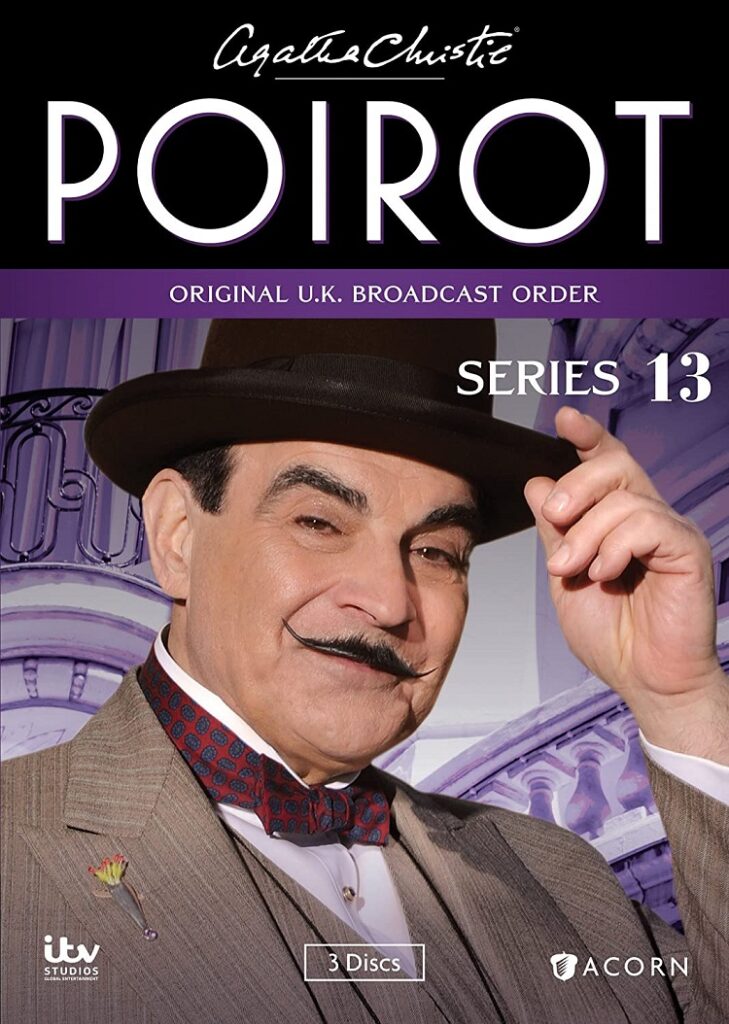
All good things must eventually end. And so it it with Poirot. After 22 years, 13 series, and 65 films Agatha Christie’s Poirot has come to its conclusion. With Curtain: Poirot’s Last Case, David Suchet has played Hercule Poirot in every story Agatha Christie wrote about the famed detective.
That is quite a spectacular achievement when you think about it. Now anytime you read a Poirot story you can sit back and watch the movie too. Students everywhere studying the Belgian sleuth can now literally watch all the movies before they read the stories. That’s quite wonderful, really.
This last season of Poirot aired from June to November of 2013. Now it’s available on DVD. This not only completes the series collection on DVD but it also finishes out Acorn Media’s redistribution of the series in its original UK broadcast order and edit. Previously A&E had released seasons 7 through 10 in the American release order which were also missing several scenes from the original British broadcasts. This set includes five movies: Elephants Can Remember, The Big Four, Dead Man’s Folly, The Labours of Hercules, and Curtain: Poirot’s Last Case.
In Elephants Can Remember, Poirot is approached by Christie’s literary stand-in Ariande Oliver (Zoë Wanamaker) to help solve a decade’s old mystery – who killed General Ravenscroft (Adrian Lukis) and his wife Margaret (Annabel Mullion)? The two had been found outside their manor house in Overcliffe shot to death. But the revolver was found amongst them and with only their fingerprints on it. At the time, police could not discover whether it was a double-suicide or a murder-suicide. At first, Poirot is not interested in the case but is slowly drawn into it.
The Big Four is set against the backdrop of the imminent threat of World War II. Poirot is pitted against a mysterious group of four who seemingly have the power to manipulate world events and bring the country closer to war. They are also responsible for a series of violent murders that Poirot must solve quickly before unstoppable damage occurs.
In Dead Man’s Folly, Ariande Oliver once again summons Poirot’s help when she fears something terrible is going to happen at a party. Sure enough, a girl playing the murder victim during the party winds up true and dead – murdered.
The Labours of Hercules finds Poirot in a depressed state after a set-up to capture an art thief backfires, leading to not only having the art stolen but its owner murdered. Poirot retreats to a secluded hotel high in the Swiss Alps only to learn the thief is staying at the same hotel and everyone become suspect.
And now we arrive at Curtain: Poirot’s Last Case. Christie actually wrote the story in the 1940s long before she had finished writing about the detective with the little gray cells. She did not publish it then but locked it away with instructions to publish it after she died. In the end, she lived a long life and towards the end she allowed it to be published while still living and let it stand as Poirot’s last story.
In it Poirot is old and sick, wheel-chair bound and dying. He returns with Hastings (Hugh Fraser) to Styles where the two solved their very first murder together. Poirot tells Hastings he is sure a murder will soon be committed but cannot say who will be killed or do the killing. As Poirot cannot move about as easily as he likes, Hastings becomes his eyes and ears. Ever impatient, Poirot constantly berates Hastings for not paying close attention to everyone, asking the wrong questions and forever not being where he should be. They eventually solve the case and Poirot, well Poirot dies. I don’t suppose that’s too much of a spoiler as I knew it coming in and I’ve paid very little attention to these final stories before now.
The finale is handled very well. In many ways its a typical case – someone is murdered, questions are asked, dark secrets are revealed, and the mystery is solved. There is no Sopranos-style grayness, nor a Newhart-type twist. It’s not even a Breaking Bad wrap everything up in a tight little bow ending. The case is solved, Poirot dies. The end. There is a nice little moment at the end where Poirot stares deep into our eyes and we feel the weight of all those years, all those cases, all those hours watching him in the dark. And then there is nothing.
This is as it should be. Like Christie’s stories, the show was not the greatest of Art. These are stories well told, but ultimately forgettable. I’ve read many of the books and now seen many of these movies, and yet when I think back they all tend to blend together. There is a real sameness in these movies and in a way that’s what makes them so enjoyable. You can turn on Poirot, any which one you like, and you’ll know that for about an hour you’ll be entertained by a murder, a mystery, and a funny little Belgian who is smarter than everyone else in the room and knows it too.
There is something comforting in that. Something kind of magical. And now we have them all – 13 seasons, 65 episodes, and we can watch them over and over again, wrapped up in a warm little blanket of television goodness.